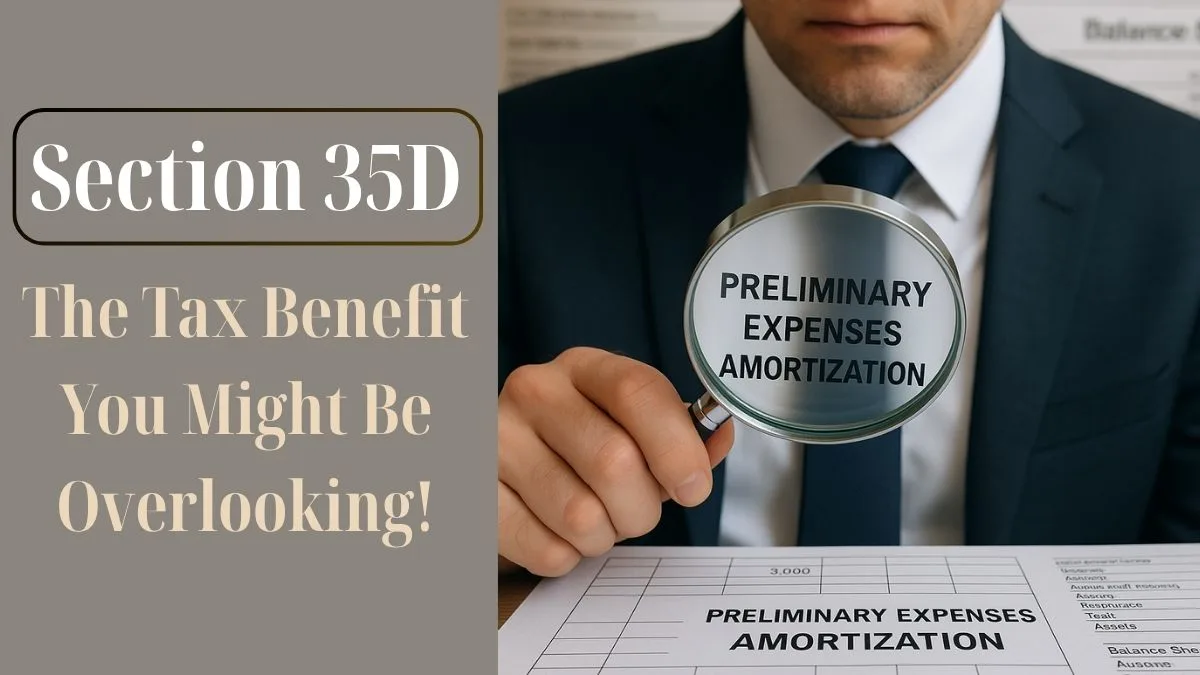
Starting or expanding a business involves several initial costs, many of which are unavoidable. To ease this financial burden, the Income Tax Act, 1961, introduces Section 35D, which provides for the amortisation of certain preliminary expenses. This section is a valuable tool for both new businesses & expanding enterprises, allowing them to claim tax benefits for qualifying expenses.
Section 35D aims to promote entrepreneurship by ensuring that essential preliminary expenses are not treated as a one-time financial blow but can instead be amortised over a specified period.
What is Amortisation of Preliminary Expenses?
In simple terms, amortisation means spreading the cost of an expense over several years instead of claiming it all at once. Section 35D provides for the amortisation of preliminary expenses over five equal annual instalments.
These expenses typically include:
- Legal & professional fees
- Feasibility or project reports
- Market surveys
- Preparation of agreements
- Company incorporation costs
Such expenses can be significant, especially for start-ups, & this provision provides entrepreneurs with the facility to claim deductions for preliminary expenses, making business set-up less taxing—literally! "
Eligibility for Deduction under Section 35D
To claim benefits under Section 35D of the Income Tax Act, the following conditions must be met:
- The expenditure must be incurred before the commencement of business or in connection with the extension of an existing undertaking or the setting up of a new unit.
- The assessee must be an Indian company or a resident non-corporate assessee.
- Expenses must fall within the list of approved expenses defined under the section.
This provision provides for the deduction of certain expenses that would otherwise be disallowed as capital expenditure.
How Does Section 35D Work? (With Example)
Let’s understand this with a simple example.
Suppose Mr. Sharma starts a new manufacturing company. He incurs ₹5,00,000 towards legal advice, drafting agreements, market analysis, & other eligible preliminary expenses. Under Section 35D, Mr. Sharma can claim a deduction of ₹1,00,000 every year for 5 years from his taxable income.
This amortisation of preliminary expenses ensures that the tax burden is spread evenly, making it more manageable for businesses. "
Key Highlights of Section 35D
✅ Provides for amortisation of certain preliminary expenses over five years.
✅ Applicable to both new businesses & business expansion.
✅ Helps reduce taxable profits by spreading out eligible costs.
✅ Encourages entrepreneurship & industrial growth by offering financial relief.
In short, Section 35D provides for the deduction of certain expenses which could otherwise discourage individuals from starting or growing a business.
Common Mistakes to Avoid
While Section 35D of the Income Tax Act offers clear tax benefits, many businesses either:
- Forget to claim this deduction.
- Claim ineligible expenses (leading to disallowance).
- Fail to spread the deduction evenly over five years.
Always maintain proper documentation & seek professional advice when applying these provisions.
Final Thoughts
The Income Tax Act, 1961, through Section 35D, extends a helping hand to businesses by allowing them to amortise the preliminary expenses that are often heavy on the pocket. This provision not only reduces the immediate tax liability but also provides financial flexibility in the crucial early years of business operations.
Understanding how to use Section 35D of the Income Tax Act effectively can lead to significant tax savings & better financial planning for your venture.
👉 Looking for expert help in maximising your deductions & filing your ITR seamlessly?
Visit Callmyca.com—where our team of expert CAs helps businesses like yours save money & stay compliant. Let’s make taxes stress-free, together!











